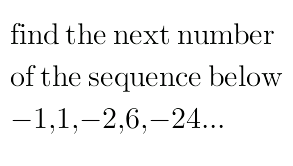
Question and Answers Forum
Question Number 30355 by mondodotto@gmail.com last updated on 21/Feb/18

Answered by $@ty@m last updated on 21/Feb/18

Commented by mondodotto@gmail.com last updated on 21/Feb/18

Commented by MJS last updated on 21/Feb/18

Answered by MJS last updated on 21/Feb/18

Commented by mondodotto@gmail.com last updated on 21/Feb/18

Commented by MJS last updated on 21/Feb/18
![5 given points determine a polynome function P_1 = [(1),((−1)) ] P_2 = [(2),(1) ] P_3 = [(3),((−2)) ] P_4 = [(4),(6) ] P_5 = [(5),((−24)) ] P_n = [(x_n ),(y_n ) ] with y_n =ax_n ^4 +bx_n ^3 +cx_n ^2 +dx_n +e lead to a linear system which can be solved for {a, b, c, d, e}](Q30380.png)
